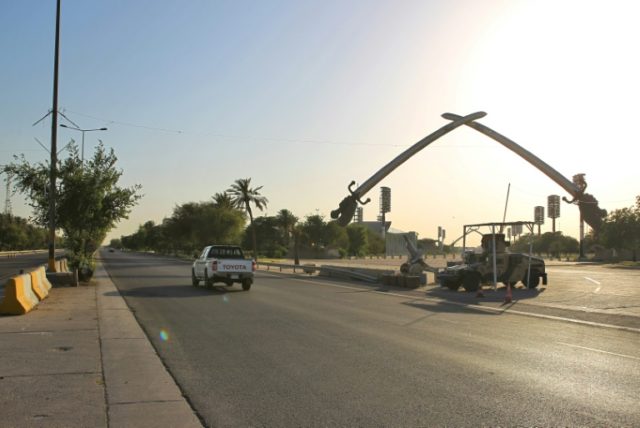Baghdad (AFP) – It was long the seat of Saddam Hussein’s iron-fisted rule, then a sealed-off symbol of US occupation and, more recently, out-of-touch politicians. On Tuesday, Baghdad’s emblematic “Green Zone” fully reopens.
The move is yet another signal that Iraq is getting back on its feet after decades of conflict — and that its government is searching for political capital to head off summertime protests.
The high-security zone in the centre of Baghdad had been totally inaccessible for a vast majority of Iraqis since the US-led invasion that toppled Saddam Hussein in 2003.
Since coming to power last year, Prime Minister Adel Abdel Mahdi has ordered the gradual shedding of concrete blast walls and checkpoints around the area, and opened a few routes to through traffic during set windows.
Starting Tuesday, a holiday marking the end of the Muslim fasting month of Ramadan, all main roads criss-crossing the enclave will be open around the clock.
“It’s great news,” bellowed Abu Majed, a 49-year-old taxi driver caught behind the wheel in one of Baghdad’s notorious traffic jams.
He hadn’t seen the inside of the Green Zone since 2003. For him, the most important impact would be practical.
“There will be less traffic,” he shrugged as he inched his car forward.
– Green, and unseen –
The 10-square kilometre (3.8-square mile) zone lies on the western bank of Iraq’s famed Tigris river.
Before 2003, it was known as “Parliament District” because it was home to the legislative body, as well as presidential palaces, ministries, and luxurious villas reserved for those in Saddam’s inner circle.
On weekends, Iraqi families would flood its perfectly-manicured lawns and expansive roundabouts to marvel at the area’s imposing monuments.
They included the massive “Crossed Swords” to mark Iraq’s war against Iran and the Monument to the Unknown Soldier.
When US-led troops captured Baghdad, they set up inside the neighbourhood’s imposing palace and villas, erecting blast walls topped with barbed wire and limiting entry to a handful of checkpoints.
It became the “Green Zone” — distinguishing it from what was then seen as the dangerous, no-go “Red Zone” that formed the rest of Baghdad.
Most Iraqis were categorically barred from it, while those who owned homes inside had to acquire special badges granting them permission to enter.
Even across the river, the beloved view of beautiful homes and government institutions was replaced by a monochrome concrete wall hiding the horizon from view.
– A new era? –
US troops handed over control of the Green Zone to Iraqi authorities a decade ago, but restrictions remained tight.
United Nations employees as well as foreign diplomats at embassies including the US and UK rarely left the area, earning it the secondary nickname of “the bubble.”
Iraqi officials, meanwhile, were criticised for squirrelling themselves away in an area their constituents could not access.
It therefore became a potent symbol in a country ranked by Transparency International as the 12th most corrupt in the world.
That could all change now.
If they can no longer hide behind blast walls, said political commentator Ghaleb al-Shabandar, politicians “will lose their sense of superiority towards other people.”
The reopening could also help restore Baghdad’s centuries-old role as a metropolitan destination, before it became synonymous with bloodshed and instability.
As the ancient capital of the Abbasid caliphate, Baghdad was known as a cultural powerhouse to which academics flocked from around the world.
In a small way, Tuesday’s reopening could herald a modern version of that legacy, said Fadel Abou Raghif, an Iraqi security expert.
“It proves that the situation is stable, that businesses and investors can come to Iraq,” he told AFP.
But for Abu Sadek, a 40-year-old electrician and one of Baghdad’s eight million residents, there is more to be done.
“What people want is less traffic, less poverty, and public services like water, electricity, and healthcare,” he told AFP.
“It’s been 15 years that government officials do nothing for us.”

COMMENTS
Please let us know if you're having issues with commenting.